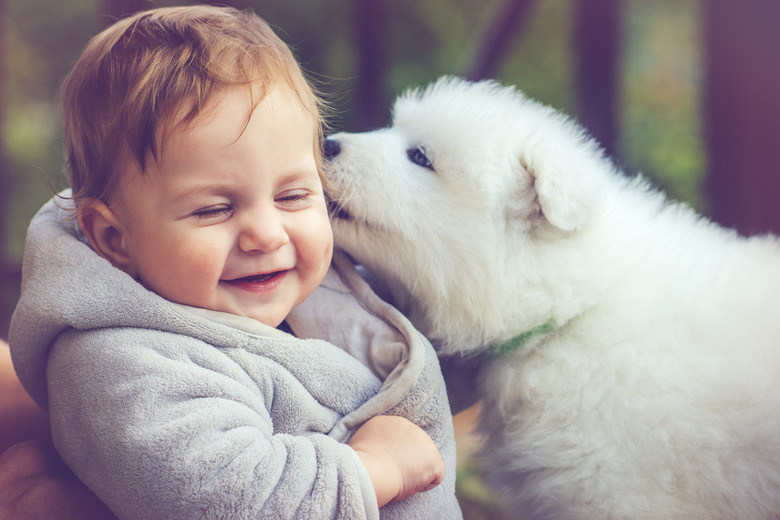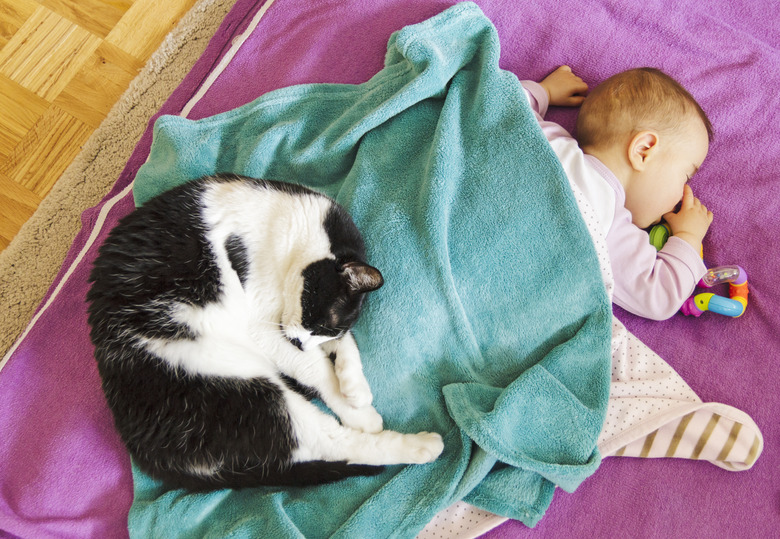Do Cats & Dogs Know What Babies Are?
Most people who have both a pet and a (human) baby will tell you that the pet acts differently around the baby. Many people report that their pets seem to know to be gentle around human young. But do our pets really understand what a human baby is?
Dogs
Dogs
Some experts believe that dogs do have a sense of the difference between a baby (or a young child) and an adult human. According to Animal Planet, dogs, being pack animals, have a strong sense of who their family is (that's you!). As you probably know, dogs can be fiercely protective of their owners. So it follows that they might be even more protective of a family member who's especially small.
We're not completely sure what clues dogs into the fact that babies are more helpless than adults. It's easy to say "it's because babies look smaller," but keep in mind that a dog's sense of smell is their primary way of gathering information. As humans, we rely much more heavily on our sense of sight than our comparatively terrible sense of smell. Though we don't know for sure, babies may smell differently to our dogs than human adults do, which may help them understand what your baby's deal is.
Of course, even if your dog has always been great around babies, you'll want to prepare your dog for a new baby's arrival. The ASPCA has some excellent tips on how to prepare your dog for their new baby sibling.
Cats
Cats
There are a number of mind-blowingly stupid myths surrounding cats and babies. A surprisingly persistent one is the belief that cats will suck the breath out of babies. How this myth has made it to 2017 is anyone's guess — it sounds it's straight out of Salem circa 1692. Needless to say (I hope), it's not true. It's an old belief that stems from the superstition that cats are evil.
NOM NOM: DO CATS & DOGS GET TIRED OF EATING THE SAME THING?
This myth also may have something to do with the fact that cats sometimes climb into cribs with babies (aw!). However, they don't do this to for any evil purpose. Rather, cats seek out heat and coziness, and babies' cribs provide both. (Though unlikely, it is technically possible for a cat to accidentally smother a baby by lying across its mouth, so never leave a baby and a cat unattended in the crib.)
There's very little research on whether cats understand what the deal is with human babies. As stated above, they do have a tendency to crawl into cribs with sleeping infants, but that's probably due to the fact that cats love warmth and comfort, and babies, with their zeal for sleeping, are a handy source of both. Anecdotally, many cat owners also report that their cat is exceptionally patient with their baby, demonstrating more tolerance toward the baby than they do with any adult.
Interestingly, research suggests that most mammals respond to the cries of newborns, regardless of species. This would explain why both cats and dogs seem to react to the cries of human infants, and may also explain why they would demonstrate patience toward them.
Though it's not completely clear how our pets perceive our babies, we can all agree on one thing: There can never be enough videos of the two together.
Are you interested in learning more about what you're reading? Then scroll through this article about what it means when your pet doesn't remember you. Also, like us on Facebook and join our newsletter to learn more about your pet's behavior.

